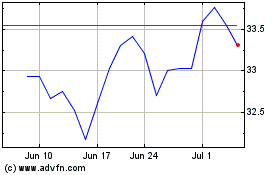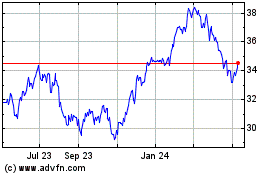By Jacquie McNish in Toronto and Paul Ziobro and David Benoit in New York
Hunter Harrison has spent several years trying to assemble a
transcontinental railroad empire. This week the 72-year-old
maverick set aside that pursuit but not his desire to run one of
America's biggest railroads.
Mr. Harrison abruptly left his job Wednesday as chief executive
of Canadian Pacific Railway Ltd., leaving behind $89 million in
compensation, to team up with activist investor Paul Hilal to shake
up management at U.S. rival CSX Corp., according to people familiar
with the matter.
Investors cheered the notion, sending shares of CSX up 23%
Thursday to an all-time high of $45.51, giving the company a market
value of nearly $41 billion. The stock has doubled over the past
year.
While he was running CP, Mr. Harrison twice tried to acquire CSX
and failed. He also launched a hostile bid for rival Norfolk
Southern Corp. that ended in defeat last year. Each time the
message was similar: Mr. Harrison has proved himself able to cut
costs and improve operations and is a better executive than your
current team.
Mr. Harrison and his backers are expected to use activist
tactics to press CSX to install him in a senior leadership role at
the Jacksonville, Fla., company, but they don't currently have
plans to push for another industry merger, the people said.
Thursday's stock-price jump reflects the loyal following Mr.
Harrison has earned from investors for his so-called precision
railroad management strategy, which combines aggressive
cost-cutting with tightly controlled train schedules.
The strategy was first honed at Illinois Central after Mr.
Harrison was hired by a private-equity firm in 1989 to revive a
railroad plagued with financial and operating problems. He applied
the same techniques to Canadian National Railway Co. and, later,
CP.
Mr. Harrison has such reverence for his operating strategy that
the Memphis-born son of a former traveling preacher organized
"Hunter Camps, " daylong brainstorming sessions at CN and CP to
spread the gospel with staff about running a more efficient
railway.
Unlike his takeover attempts, Mr. Harrison may find a more
receptive ear at CSX if his plan is to work at the company,
investors and analysts say. Such a move wouldn't raise the
antitrust concerns of a takeover. Plus, CSX has a chief executive
near retirement age.
CSX said its board of directors will "actively evaluate" the
views of Mr. Hilal's fund, Mantle Ridge LP, and looks forward to
discussing the company's strategy with shareholders. The railroad
also said its board and management team remain supportive of the
company's current strategy.
The campaign for CSX will closely resemble when Pershing Square
Capital Management LP , Mr. Hilal's former firm, ran a successful
proxy battle in 2012 to replace a majority of CP's directors and
install Mr. Harrison as the CEO.
Mr. Hilal, who was a partner at Pershing Square, helped steer
the CP proxy battle. The team will also include Mark Wallace, a
longtime lieutenant to Mr. Harrison and a CP executive who is
expected to resign from the railway, according to people familiar
with the matter.
Mr. Harrison will likely face questions about his health. He is
six years older than CSX's current chief executive, Michael Ward,
and had health issues in 2015. After a bout of pneumonia and other
complications, Mr. Harrison took sick leave for several weeks,
after which his doctors recommended he limit long-distance
traveling.
One person close to Mr. Harrison said his doctors have cleared
him to continue working. Travel will be more limited if he moves to
CSX as its Jacksonville headquarters is about 300 miles north of
the Harrison family horse farm near West Palm Beach, Fla.
Anthony Hatch, a New York-based railway consultant who has known
Mr. Harrison for years, said the executive doesn't "feel like going
out to pasture."
One institutional investor welcomed the notion of Mr. Harrison
as the next CSX leader. At Canadian Pacific, "he took the worst
performing railroad ... and turned it around in a relatively short
period of time," this investor said. But the investor acknowledged
that age was a concern, adding "you generally look for someone who
will be there for a decade."
Bringing in Mr. Harrison could help with the succession plan for
Mr. Ward, who took over as CEO in 2003 and has spent nearly four
decades with CSX. Mr. Ward's retirement was delayed two years ago
when the company lost its No. 2 executive, Oscar Munoz, to the top
job at United Continental Holdings Inc.
"CSX management may be more receptive than people think," wrote
Citi analyst Christian Wetherbee.
Word of Mr. Harrison's plan comes as the railroad industry sees
brighter days ahead, with moderating losses in coal revenue and
rising consumer and business confidence.
"There's reason to be optimistic that we'll really start seeing
some uptick in volume," Union Pacific Corp. CEO Lance Fritz said in
an interview.
CSX, which operates one of two major rail networks east of the
Mississippi, on Tuesday reported a slight dip in fourth-quarter
profit but projected higher profit for the coming year despite a
stronger U.S. dollar and low commodity prices.
One area where the company has room to improve is profitability.
CSX has for years aimed to reach an operating ratio -- a measure of
costs as a percentage of revenue -- in the mid-60s. In its last
fiscal year, its ratio was just under 70%.
--Joann S. Lublin and David George-Cosh contributed to this
article.
Write to Jacquie McNish at Jacquie.McNish@wsj.com, Paul Ziobro
at Paul.Ziobro@wsj.com and David Benoit at david.benoit@wsj.com
(END) Dow Jones Newswires
January 19, 2017 19:22 ET (00:22 GMT)
Copyright (c) 2017 Dow Jones & Company, Inc.
CSX (NASDAQ:CSX)
Historical Stock Chart
From Mar 2024 to Apr 2024

CSX (NASDAQ:CSX)
Historical Stock Chart
From Apr 2023 to Apr 2024
